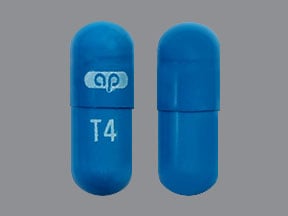
Tolterodine ER Coupons & Savings Card – Discount Prices from $26.31
Generic for: Detrol la
Tolterodine, commonly known by its brand name Detrol, is prescribed for managing symptoms of an overactive bladder (OAB). This medication helps alleviate issues like loss of bladder control, sudden urges to urinate, and frequent urination by relaxing the bladder muscles. It belongs to the class of drugs called antispasmodics and works by blocking specific receptors, allowing the bladder muscles to relax, thus improving control over urination and reducing bladder spasms. Available in both immediate-release (IR) and extended-release (ER) formulations, Tolterodine can be found in both generic and brand-name versions. Common side effects include dry mouth, headache, dizziness, and constipation. It is important to consult with a healthcare professional before starting Tolterodine, especially if taking other anticholinergic medications, as interactions may occur.
Our coupons are free to use. Before paying, show the pharmacist your Tolterodine ER savings card to get your free discount. Use our filters below to edit the prescription box to match your needs. The Tolterodine ER prices will update based on your prescription needs. Above our Tolterodine ER coupons, you can change your location to see pharmacy prices and costs in other areas. We're here to help you buy Tolterodine ER at the lowest price with our prescription discount card.
My prescription
Edit
4MG, Tolterodine ER (90 Capsule Extended Release 24 Hours)
Select pharmacy

CVS
$36.00
COUPON PRICE
Walgreens
$26.31
COUPON PRICE
Albertsons
$40.79
COUPON PRICE
Walmart
$44.81
COUPON PRICETolterodine ER savings card
Show this card to your pharmacist
Walgreens
$26.31
BIN
ID
PCN
GRP
015995
LHKPY241434
GDC
DR33
Powered by
Tolterodine, commonly known by its brand name Detrol, is prescribed for managing symptoms of an overactive bladder (OAB). This medication helps alleviate issues like loss of bladder control, sudden urges to urinate, and frequent urination by relaxing the bladder muscles. It belongs to the class of drugs called antispasmodics and works by blocking specific receptors, allowing the bladder muscles to relax, thus improving control over urination and reducing bladder spasms. Available in both immediate-release (IR) and extended-release (ER) formulations, Tolterodine can be found in both generic and brand-name versions. Common side effects include dry mouth, headache, dizziness, and constipation. It is important to consult with a healthcare professional before starting Tolterodine, especially if taking other anticholinergic medications, as interactions may occur.
Our coupons are free to use. Before paying, show the pharmacist your Tolterodine ER savings card to get your free discount. Use our filters below to edit the prescription box to match your needs. The Tolterodine ER prices will update based on your prescription needs. Above our Tolterodine ER coupons, you can change your location to see pharmacy prices and costs in other areas. We're here to help you buy Tolterodine ER at the lowest price with our prescription discount card.
More prescriptions for overactive bladder
coupons from$39.80Save 63%
coupons from$18.18Save 61%
coupons from$27.95Save 30%
coupons from$7.32Save 88%
coupons from$7.29Save 85%
coupons from$66.15Save 43%
coupons from$247.78Save 73%
coupons from$7.29Save 87%
More prescriptions for overactive bladder
Detrol Save 63%coupons from $39.80
Oxybutynin ER Save 61%coupons from $18.18
Solifenacin Save 30%coupons from $27.95
Levsin Save 88%coupons from $7.32
Levsin/sl Save 85%coupons from $7.29
Toviaz Save 43%coupons from $66.15
Vesicare Ls Save 73%coupons from $247.78
Anaspaz Save 87%coupons from $7.29
Tolterodine ER dosage forms
Use our Tolterodine ER 2MG coupon with prices from $2.94 for 1 Capsule Extended Release 24 Hour. You can also use our Tolterodine ER 2MG coupon with prices from $15.63 for 30 Capsule Extended Release 24 Hours. We have a Tolterodine ER 2MG coupon with prices from $36.00 for 90 Capsule Extended Release 24 Hours. You can use our Tolterodine ER 2MG coupon with prices from $80.20 for 500 Capsule Extended Release 24 Hours.
Dosage Quantity Price from Per unit 2MG 1 Capsule Extended Release 24 Hour $2.94 $2.94 2MG 30 Capsule Extended Release 24 Hours $15.63 $0.52 2MG 90 Capsule Extended Release 24 Hours $36.00 $0.40 2MG 500 Capsule Extended Release 24 Hours $80.20 $0.16 4MG 90 Capsule Extended Release 24 Hours $36.00 $0.40 4MG 1 Capsule Extended Release 24 Hour $2.90 $2.90 4MG 30 Capsule Extended Release 24 Hours $14.44 $0.48 4MG 500 Capsule Extended Release 24 Hours $80.20 $0.16
| Dosage | Quantity | Price from | Per unit |
|---|---|---|---|
| 2MG | 1 Capsule Extended Release 24 Hour | $2.94 | $2.94 |
| 2MG | 30 Capsule Extended Release 24 Hours | $15.63 | $0.52 |
| 2MG | 90 Capsule Extended Release 24 Hours | $36.00 | $0.40 |
| 2MG | 500 Capsule Extended Release 24 Hours | $80.20 | $0.16 |
| 4MG | 90 Capsule Extended Release 24 Hours | $36.00 | $0.40 |
| 4MG | 1 Capsule Extended Release 24 Hour | $2.90 | $2.90 |
| 4MG | 30 Capsule Extended Release 24 Hours | $14.44 | $0.48 |
| 4MG | 500 Capsule Extended Release 24 Hours | $80.20 | $0.16 |
